Article's Content
What Are Backlinks?
Backlinks are links from one webpage to another page on a different website. They are also called “incoming links”, “inbound links”, or “one-way links”.
If someone links to a page on your website, you earn a backlink, and if you link to another website’s content, they earn a backlink from you.
This is an example of a link from Venngage that leads readers to our website:
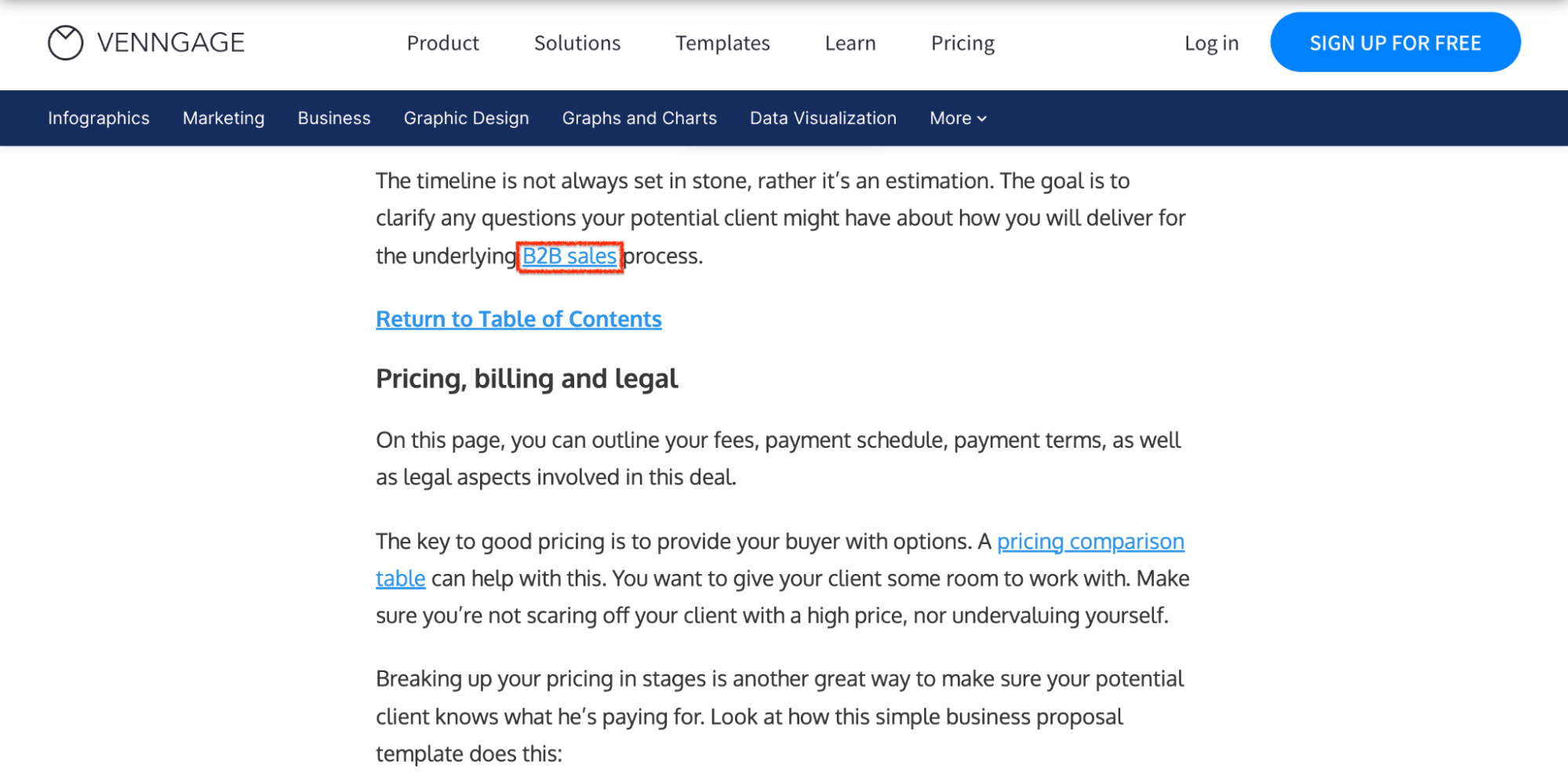
This link leads anyone interested in learning more about B2B sales to our website.
That’s what makes it a backlink. If the term “B2B sales” linked to a page on the Venngage website, it would be called an internal link.
Why Are Backlinks Important?
There are several reasons why backlinks are important. However, here are the top three:
Boosts Your Website’s Rankings on the SERPs
Major search engines like Google consider the number of incoming links on a web page to determine organic search ranking.
Backlinks are like a vote of confidence from other websites, validating the authenticity and relevance of specific content on your website.
Ahrefs found that the number of backlinks from unique websites (referring domains) correlates strongly with organic search traffic.
That means the more backlinks a page has from websites with a solid reputation, the more likely the page will rank higher for relevant search queries.
Take our Reddit statistics report, for example.
The page has generated more than 700 backlinks from high authority websites such as Semrush, YCombinator, Reddit, Substack, etc. It’s no wonder the Reddit stats report owns the featured snippet for different long-tail keywords like statistics about Reddit and several others:

The page also outranks websites with higher domain authority, such as Business Of Apps, Statista, Oberlo, and more.
Of course, we know backlinks aren’t the only determining factor when it comes to ranking on search engines. However, it’s one of the critical factors that determines organic search ranking.
Increases Your Website’s Discoverability
Backlinks are important for SEO because they help increase your website’s organic reach.
That’s because search engines like Google revisit popular pages to check for new content. If a popular website links to your content, it increases the chances of your content getting found faster than if a low authority website links to you.
Earns You More Referral Traffic
One of the underrated goals of backlinks is showing other websites’ audiences that your content is useful in their journey. When someone clicks on a link that directs them to your website, you earn referral traffic.
What Makes a High-Quality Backlink?
All backlinks aren’t equal. Some have more value than others.
Here are five attributes that make a backlink high quality.
Domain Authority
Domain authority is a search engine score that shows how relevant a website is in a specific industry. It shows how reputable a website is in the eyes of search engines.
When you get a backlink from a website with high domain authority, the website’s reputation rubs off on you.
That means you share in some of that authority, and it increases your chances of having search engines see your page as a credible source of relevant information in your industry.
Page-level authority is also important. Having a high authority website (with fewer outbound links) linked to your content makes you rank higher in the SERPs.
Topical Relevance
When a website links to your website, Google always checks to see if the two sites are related in any way. The more related their content is to each other, the more Google is likely to see this collaboration as relevant and rank-worthy.
Say you published an article on mental health awareness and several mental fitness websites link to it. Google will prioritize ranking that piece of content over a mental health awareness article that has photography or food blogs linking to it at random.
That’s because people reading a mental fitness blog are more likely to click to learn more about mental health awareness than a person reading a photography blog would.
Traffic Volume
Backlinks from websites with high organic traffic attract more referral traffic than those with low or zero traffic. Ahrefs found a little correlation between backlinks from pages with high organic traffic and SERP ranking.
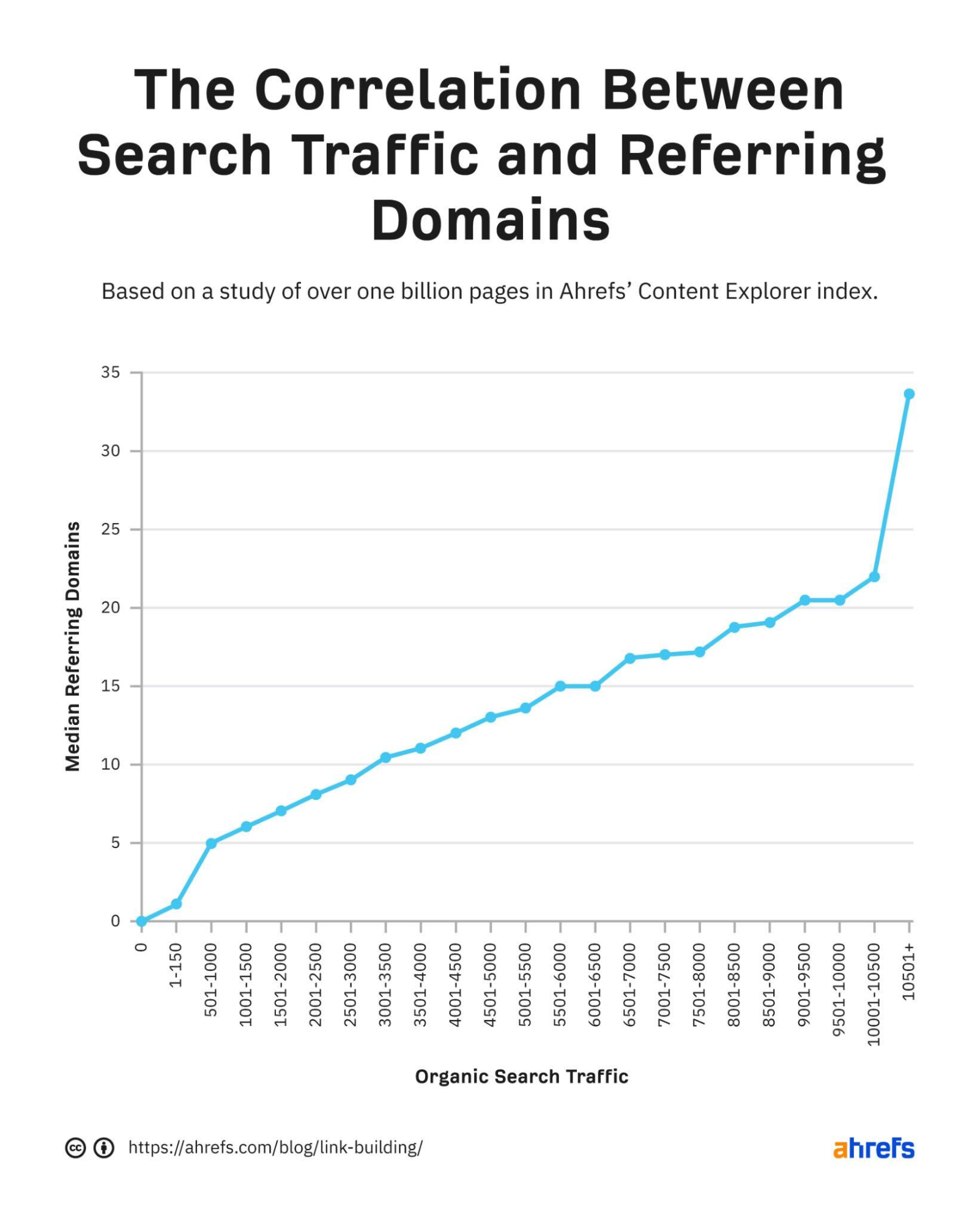
Backlinks from high organic traffic websites play a small but significant role in boosting a page’s ranking. The number of referring domains and page-level authority matter more than traffic ratings.
Position of Backlink
Where a backlink is placed is just as important as any other factors that make it high quality.
That’s because people are more likely to click a link when it’s placed in a manner that stands out. For example, SEO by Sea’s founder, Bill Slawski, advises brands to use a font and color that makes a link stand out if the link is placed in the main content area of a page.
If your link ends up in the footer area of a web page, or it’s the same color and font as the other text, or a less interesting anchor text is used, you stand little chance of earning good referral traffic from that website, no matter how much authority they have.
Type of Backlink
Nofollow backlinks have no influence on the destination page’s search ranking. That’s because Google doesn’t crawl nofollow links.
Followed backlinks, on the other hand, get tons of love from Google and other search engines. They have a massive impact on your website’s organic ranking.
Here’s how Ahrefs shows the difference:
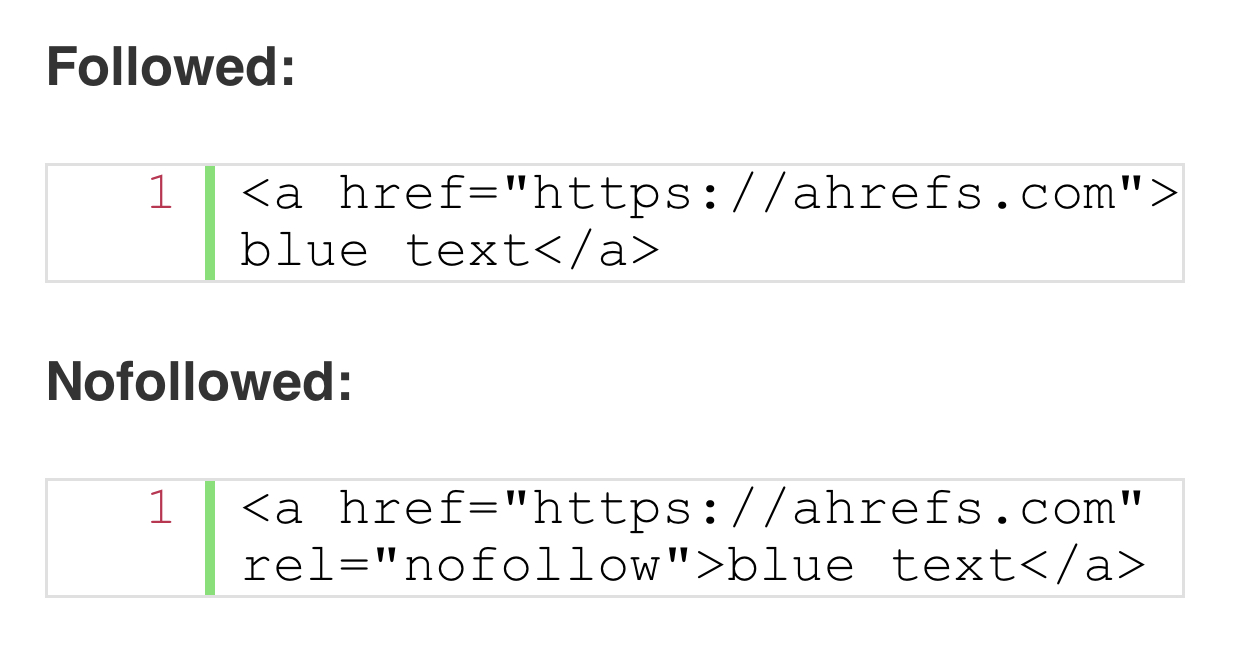
Link building takes time and consistent effort.
Some brands try to shorten the process with comment spam and blackhat backlinking methods. And search engines ignore links with “nofollow tag” attached to them.
Prioritizing getting followed links by creating relevant content and seeking backlink opportunities can pay dividends, boosting your brand’s authority and credibility in the eyes of search engines and the people.
But that doesn’t mean you should stop commenting on blogs or deprioritize your paid efforts. Organic search is good, but it isn’t the only acquisition channel.
However, if you do want to boost your organic search rankings, then focus on attracting high-quality backlinks. Five high-quality backlinks beat a thousand low-quality backlinks any day.
How to Get High-Quality Backlinks
There are three primary ways to get high-quality backlinks. You either earn them, create them, or build them. Let’s explore six ways you can leverage these methods.
Create Link-worthy Assets
One of the ways to earn high-quality backlinks is to create relevant, engaging, and valuable assets people would want to link to.
This asset can be a report, infographic, how-to guide, survey, tools, etc. Anything people would enjoy using to solve a problem.
In most cases, that asset is a piece of content that is optimized for search.
For example, we first published this statistics post in 2018 and have updated it every year since:
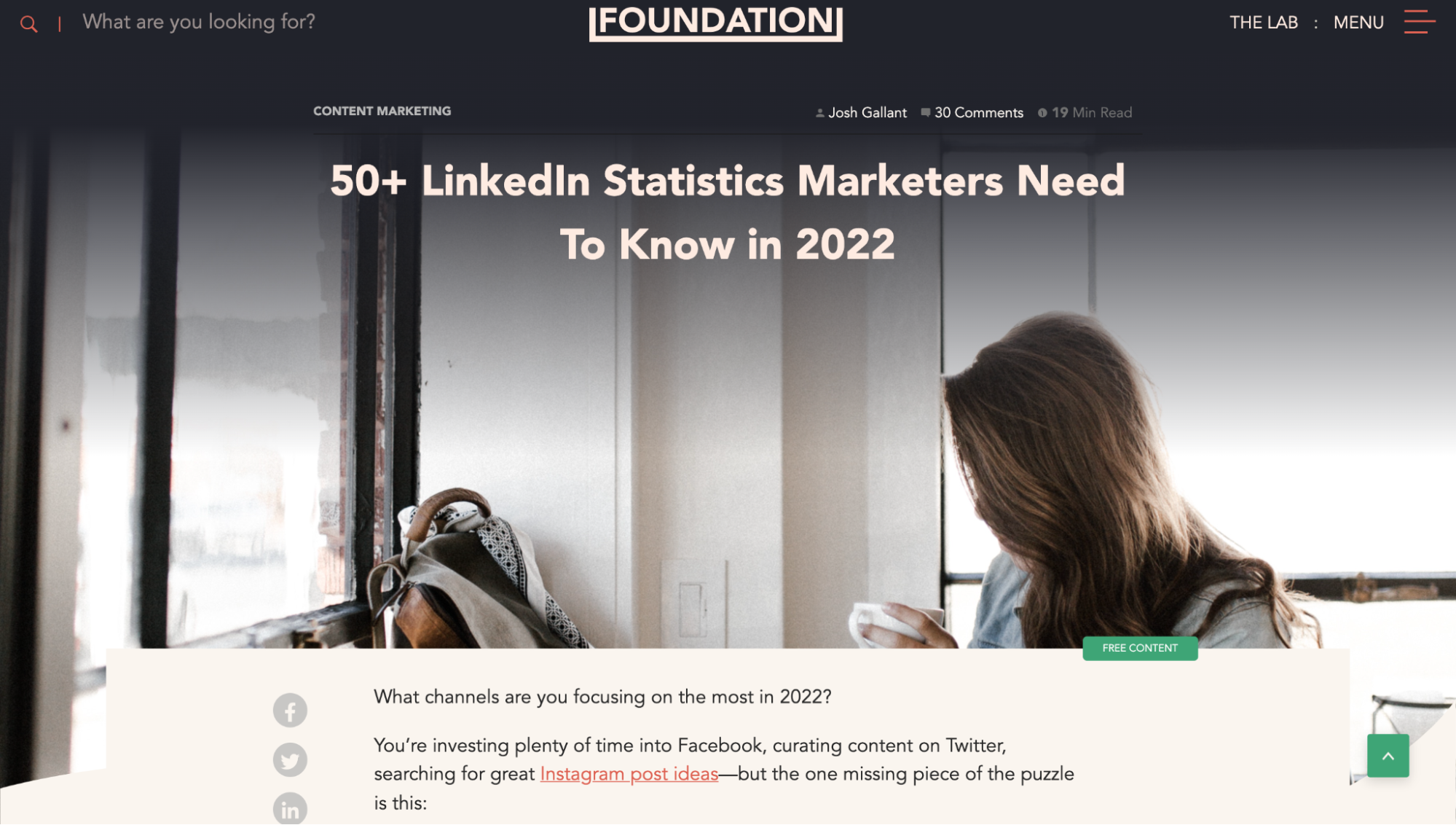
This asset has generated over 2K backlinks for more than a thousand referring domains.
Also, take Backlinko (now owned by Semrush), for example. Brian Dean and his team published this piece of content on their blog:
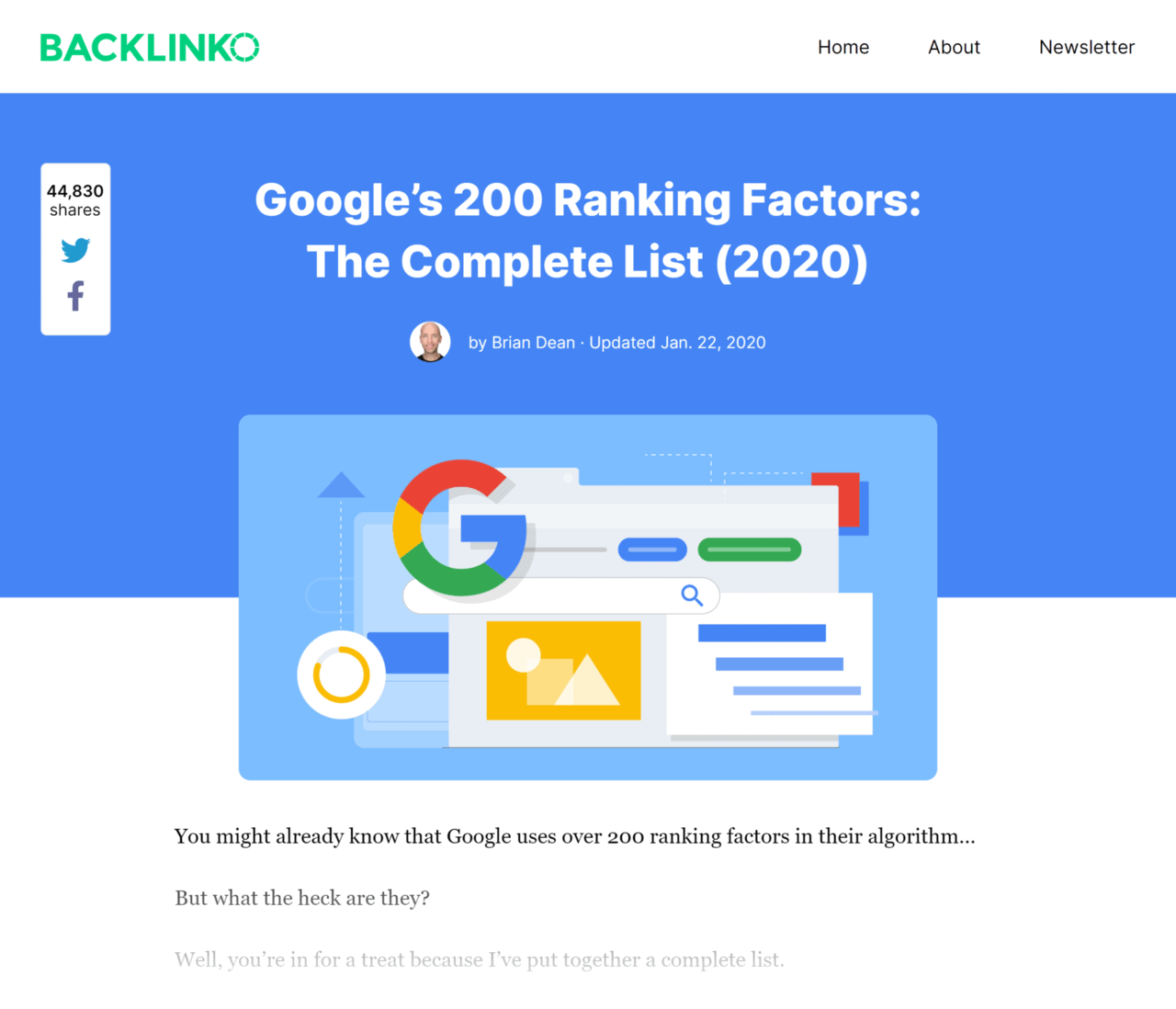
The content piece has generated over 31K backlinks from more than 7K referring domains.
This content piece, like our example, is link-worthy because it answers questions the target audience has in mind, and it’s also useful to other industry creators who want fresh, original quantitative stats to validate their opinions.
The secret is to create something other marketers or professionals in your industry will want to link to and distribute on different platforms to get more eyes on that piece of content.
Leverage Niche Newsletters & Weekly Roundups
Getting your content featured on industry newsletters and roundups is a way to build your backlink profile. That means reaching out to the site owners or editors to get featured.
One of the ways to do this is to sponsor a newsletter in your industry. Ahrefs did this some months back, and they got featured in our newsletter:
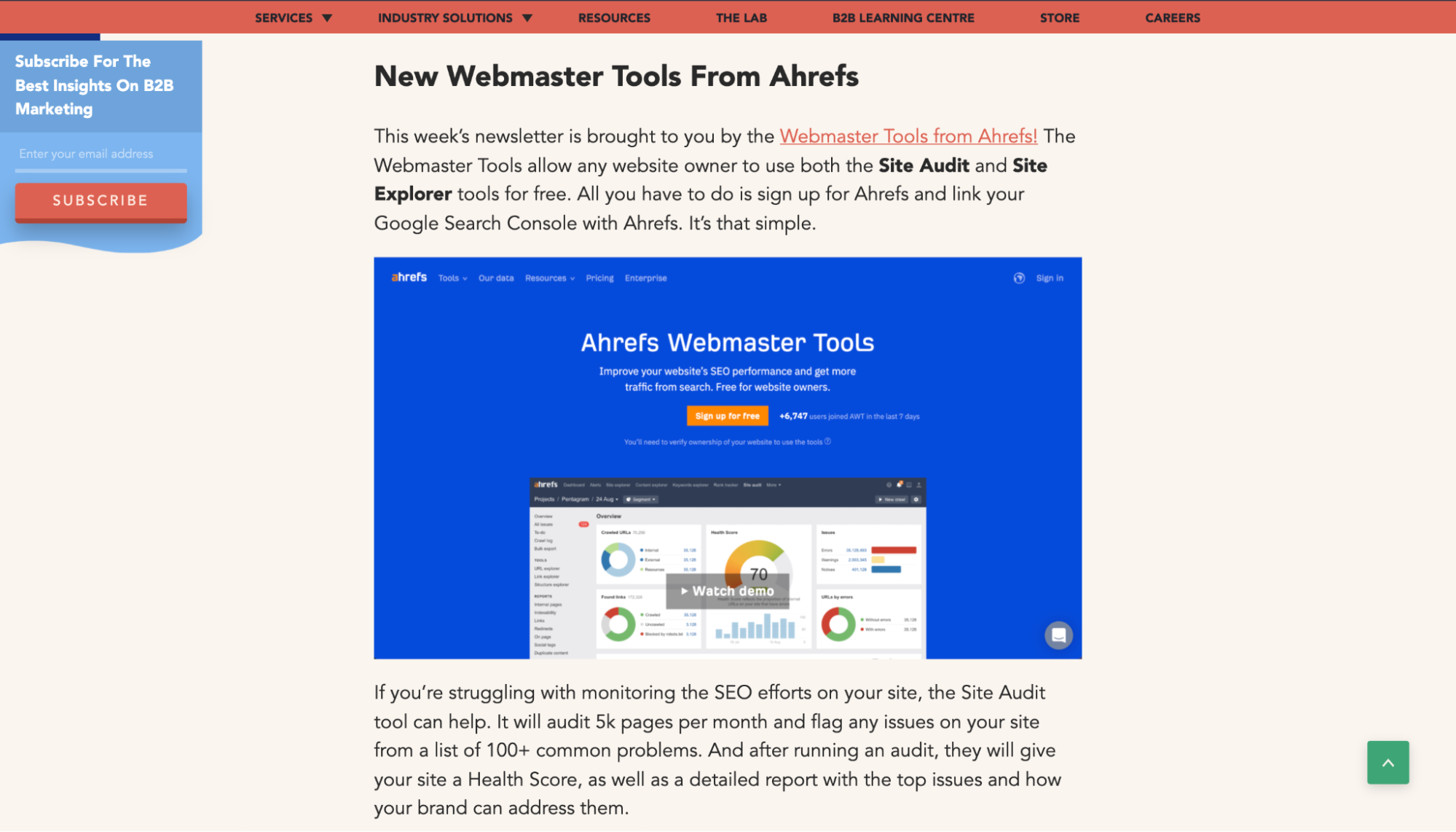
Beyond having our audience learn about their new tools, they also gain a backlink from us.
Link roundups are another way to build backlinks.
You can build a backlink via this channel by finding link roundups in your niche and reaching out. A search string like “industry keyword” + “link roundup” will show you a list of possible roundups you should reach out to.
Afterward, send a cold email, asking them to include your asset in the roundup. If they like what they see, and your email is compelling enough, you’ve earned your company a backlink.
Steal Your Competitors’ Backlinks
Another way to build backlinks is to find outdated or deleted web pages and broken links within your industry. Find websites that are still linking to the content using Ahrefs, Semrush, or any tool you prefer.
Create an updated, fresher version of the content. Then send an email to the website owners, informing them of their link to outdated content, and propose a solution—your updated content. In most cases, the admin would be more than happy to replace the outdated link with yours, especially if your content is relevant.
Leverage Broken Link Building
404 pages sometimes go unnoticed, especially for websites that hardly perform thorough content audits and updates.
You can build backlinks here by identifying 404 pages on a website, using any of the tools we mentioned earlier. You can also Google to find broken links in the resource pages of a niche website.
If you’re in the marketing industry, you can use a search string like:
“Marketing” + “resource page”
Or “Marketing” + “recommended sites”
When you find these sites, check for broken links and email the owner about anything you find, then position your website as the solution they can link to.
You can also find and reclaim unlinked mentions, leverage guest blogging, and send in testimonials to trusted third-party review sites.
Wrap Up
Backlinks are important for SEO because they give a website credibility in the eyes of search engines.
Search engines track backlinks to determine the trustworthiness of your content—the more links your page can get from other trusted pages, the better that page will look to search engines. Invest in creating link-worthy content, conducting outreach, and looking for unlinked mentions, outdated content, and broken links.
These little steps will improve your backlink profile and boost your brand’s credibility in the eyes of search engines and people.






